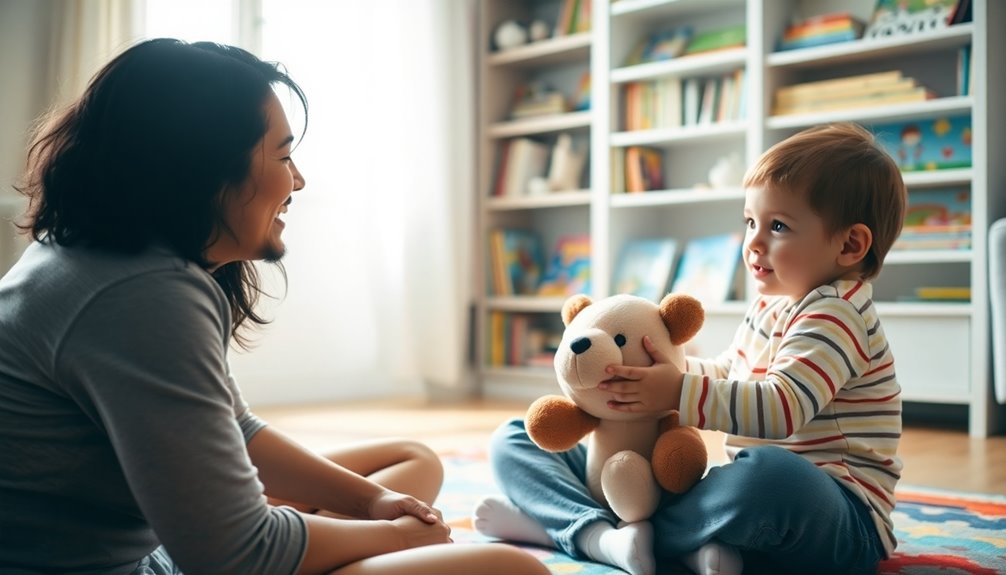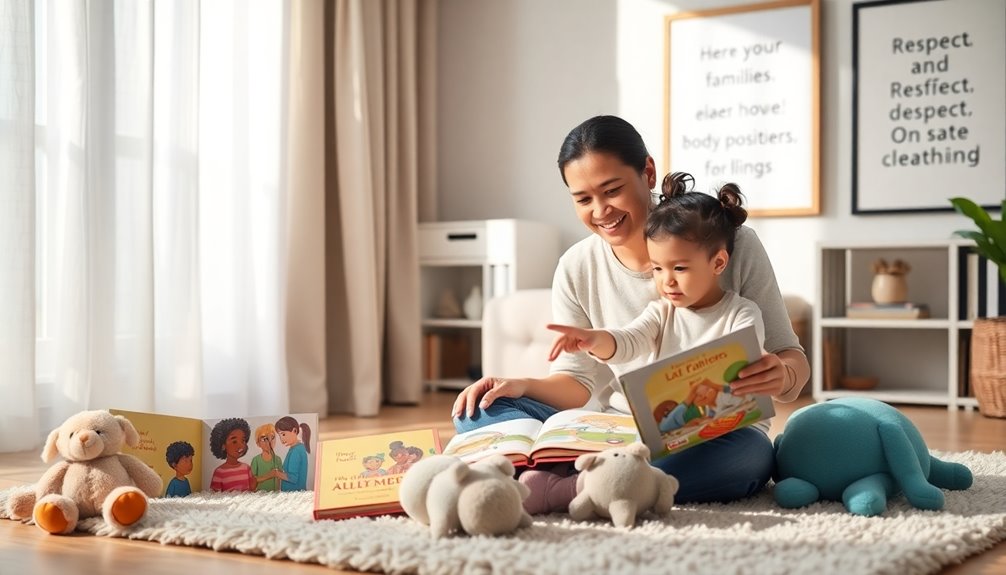Talking to your kids about sex is essential for fostering their understanding of body awareness, consent, and healthy relationships. Start early and keep discussions age-appropriate. For preschoolers, focus on body awareness and privacy; for elementary-age kids, introduce concepts like reproduction and consent. Use everyday situations to spark conversations and listen actively. Always use accurate language to enhance understanding. Normalize talking about respectful relationships and reinforce that these discussions are safe, not shameful. By creating a trusting environment, you'll empower your children to ask questions. Discover more effective strategies to strengthen these conversations for your family's needs.
Key Takeaways
- Start conversations early, focusing on body awareness and privacy for preschoolers, and expanding topics as they grow.
- Use everyday situations to introduce discussions about sexual health, ensuring they flow naturally.
- Employ accurate terminology and normalize discussions about consent and respectful relationships to promote understanding.
- Foster trust by maintaining a non-judgmental demeanor and regularly checking in with open-ended questions.
- Share personal experiences to illustrate concepts of respect and consent, reinforcing that these discussions are important and not shameful.
Importance of Open Communication

When it comes to discussing sex with kids, open communication is key. By fostering regular conversations about sexual health, you help your child develop a healthy attitude towards sex and relationships.
This ongoing dialogue creates a trusting relationship, encouraging them to feel comfortable asking questions about sex as they grow. Research shows that children exposed to thorough sex education through these discussions are more likely to engage in safer behaviors and make informed choices.
Early discussions about consent and boundaries empower kids to understand their rights and respect others.
As parents and caregivers, providing accurate information is essential, as children often turn to trusted adults for clarity rather than relying on peers or online sources, which can spread misinformation.
Age-Appropriate Discussions

Open communication lays the groundwork for discussing sensitive topics like sex, but it's equally important to approach these conversations with age-appropriate content.
For preschoolers, focus on body awareness, privacy, and the correct names for body parts.
As children enter elementary school, introduce reproduction, puberty, and the importance of consent using clear language that addresses their questions.
During the tween years, discussions can expand to include attraction, relationships, and mutual consent, guiding them through their feelings.
For teenagers, encourage critical thinking about sexual health, safe sex practices, and the emotional aspects of relationships while helping them recognize misinformation.
Tailor these conversations to fit each child's developmental readiness, ensuring discussions evolve as their understanding deepens.
Strategies for Effective Communication

How can you create a comfortable environment for discussing sensitive topics like sex with your kids? Start by using everyday situations, like media portrayals or family events, to bring up sexual health conversations naturally.
Follow your child's lead—listen to their questions and interests, allowing the conversation to flow without a strict agenda. Use accurate terminology for private parts and concepts to promote understanding and reduce shame.
Normalize discussions about consent and boundaries early on, highlighting respectful relationships as key to sexual health education.
Finally, maintain a non-judgmental demeanor, reassuring your kids that their questions are valid. This approach fosters a safe space for ongoing dialogues, making it easier for parents and kids to engage in these vital conversations.
Building Trust and Comfort

Creating trust and comfort in conversations about sexual health is essential, as it encourages your child to approach you with questions and concerns.
Start early, and let them know these discussions are ongoing. Regularly check in and ask open-ended questions, so they feel comfortable asking anything. Reinforce that there's nothing to be ashamed of when discussing sexual health. It's important to maintain a respectful relationship with your child, similar to the way one should in co-parenting relationships. Additionally, fostering an environment of emotional expression can further help your child feel safe discussing sensitive topics.
Share personal stories to illustrate respect and consent, making the topics relatable. This can help them understand the importance of these conversations with their parents. Additionally, consider utilizing resources for mental health to support both you and your child during these discussions.
Related Topics on Parenting

While discussing sex education is important, it's equally essential to explore related topics on parenting that contribute to your child's overall well-being.
Parents need to prioritize their child's health by staying informed about food safety, especially with recent FDA regulations on baby food. Engaging young children in age-appropriate discussions during crises can help alleviate fears and foster communication. Additionally, ensuring that infants receive safe sleep practices can significantly enhance their health and safety during their early developmental stages. It is also important to recognize that emotional dysregulation can affect children's behavior and relationships, necessitating supportive parenting strategies. Creating a Montessori-inspired environment can promote independence and cognitive development during early childhood.
Understanding maternal health issues, like the benefits of iron infusions, can lead to better outcomes for both mothers and their children. Professional counseling can also be a valuable resource for parents navigating emotional challenges that may impact their parenting.
As your child grows into their teen years, maintaining open lines of communication about relationships and mental health becomes vital. Encourage them to ask questions, ensuring they feel comfortable discussing these important topics with you.
Frequently Asked Questions
What Age Should You Talk to Your Child About Sex?
You should start talking to your child about sex early, ideally around ages 2-3. At this age, focus on body awareness and privacy.
As they grow, around 3-5 years, teach them the proper names for body parts and basic consent.
By elementary school, discussions should include reproduction and puberty, evolving to cover emotional changes and attraction in middle school.
In high school, emphasize safe sex practices and the importance of healthy relationships.
How Do You Explain Sex to a 10 Year Old?
Think of a garden, where understanding blooms. When you explain sex to your 10-year-old, start by evaluating what they know, gently correcting any misconceptions.
Use simple language to describe how bodies work, emphasizing consent and respect. Normalize puberty as a natural growth phase.
Discuss healthy relationships, focusing on communication and trust. Provide supportive resources like books or videos, ensuring they feel safe coming to you with any questions or feelings.
How to Start a Sex Talk With Kids?
Starting a talk with kids can feel intimidating, but it doesn't have to be! Look for everyday moments—like during bath time or while watching a movie—where you can naturally introduce topics.
Use simple, age-appropriate language and encourage them to ask questions. Make sure to create a safe space for them, so they feel comfortable sharing their thoughts.
How Do Parents Tell Their Kids About Sex?
You might wonder how to approach the delicate topic of sex with your kids. Start by using the right names for body parts and discussing privacy, laying a foundation for trust.
As they grow, tailor your conversations to their developmental stage, integrating lessons about consent and relationships. Use everyday moments as opportunities to engage them.
Conclusion
Talking to your kids about sex doesn't have to feel like steering through a stormy sea. Instead, think of it as guiding them through a colorful garden, where curiosity blooms and questions flourish. By fostering open communication, you'll create a safe space for them to explore and understand their feelings. Embrace the journey, knowing that each conversation strengthens your bond and equips them with the knowledge they need to steer through life's complexities with confidence and comfort.









